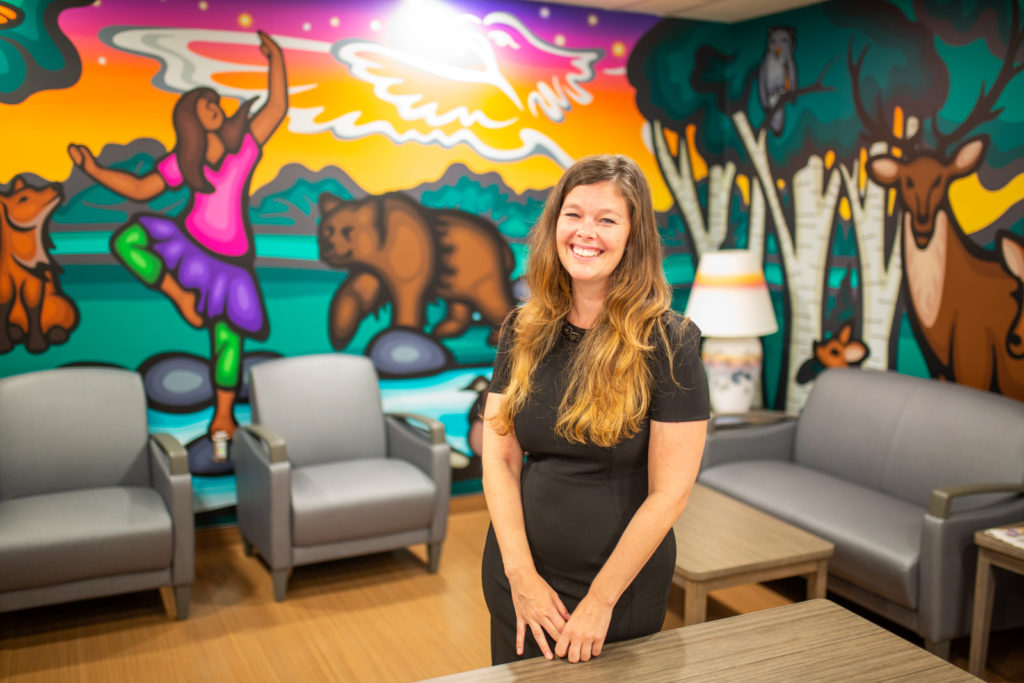
Improving care for Indigenous children with cancer
Written By: Dr. Stacey Marjerrison, pediatric oncologist at McMaster Children’s Hospital and assistant professor at McMaster University.
Treating childhood cancer is an incredible privilege. Most days, I get to meet families facing their worst nightmare, and have the honour of watching them find strength they didn’t know they had. I get to giggle with kids who somehow manage to find joy and humour in the most trying circumstances. I get to say the words: “the cancer is in remission” and see parents’ faces light up with relief. But, that isn’t every day.
One in five children with cancer will not survive. We do not yet have the tools to save every child’s life. We do, however, have the tools to make their cancer journey better. When days get tough, being able to take a step back and think about how I can improve the cancer journey for all of the families that I help care for makes those awful days easier.
We know that for marginalized families, the cancer journey is tougher than average. Families from low-income neighbourhoods and low-income countries face additional hurdles to those of an average family. Among them are Indigenous families living in Canada. Improving care for marginalized families, including Indigenous families, is the major focus of my research.
I noticed early in my career the differences in survival that Indigenous kids with cancer were facing.
I’m a childhood cancer doctor and a researcher, but I am not an expert on Indigenous health. I noticed early in my career the differences in survival that Indigenous kids with cancer were facing across American studies. Working with experts in Indigenous health, I set about trying to answer the question being asked by many of our Indigenous patients: does this difference also exist in Canada? Our analysis in Ontario showed that First Nations, Inuit and Métis kids diagnosed with childhood cancer had about a 15 per cent lower survival rate than the general population. But, we noted that this difference doesn’t seem to be due to factors such as the time it took for a child to be diagnosed, their adherence to treatment, individual characteristics (age, gender, nutritional status), the severity of the disease, or the strength of the treatment. Our findings differed from a study from Manitoba (which showed no worse outcomes for First Nations children), so we’re now working together on a Canadian-wide analysis. We hope this will help us discover if outcomes have been worse for Indigenous kids with cancer, and if so, why this difference exists and how we can close the gap.
Research is an opportunity for us to learn how we can make the cancer journey easier for our patients and their families.
Beyond survival, we must also improve the health journey for families. We know that Indigenous Canadians often face systemic racism when interacting with the healthcare system, and when participating in healthcare research. Working with Dr. Chelsea Gabel – an expert in Indigenous well-being – my colleagues and I published a review of ways to improve Indigenous health research in Canada. Ensuring meaningful partnership with Indigenous communities and scholars, considering Indigenous methods and methodologies, and making sure that research findings are considered within the context of Colonial history and current inequities are some of the ways forward.
We also need to ensure that healthcare providers are educated to provide culturally safe and informed care to Indigenous patients. As such, I’m helping to develop new curricula for post-graduate students under the umbrella of the McMaster University Faculty of Health Sciences Indigenous Health Initiative. We hope to build on the lessons we’re learning through a qualitative evaluation of the pediatric residency curriculum this past year, applying our findings across the programs at McMaster.
Inside the hospital, we also hope that the recent opening of Mkoonhs Zhongehgii Iako’nikonhrahnira:ton, our Indigenous family room at the McMaster Children’s Hospital, creates a space where all our Indigenous families feel welcome.
Finally, on an international scale, I’m working with global experts to evaluate how to safely integrate Traditional and complementary medicines into childhood cancer care; a priority for many Indigenous Peoples.
Walking with families through their childhood cancer journey is an honour. Research is an opportunity for us – as healthcare providers – to learn how we can make that journey easier for our patients and their families.
